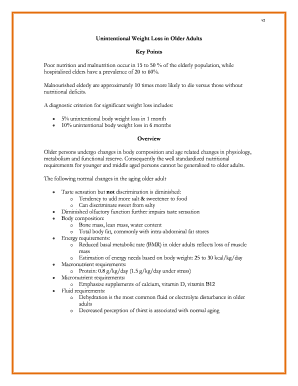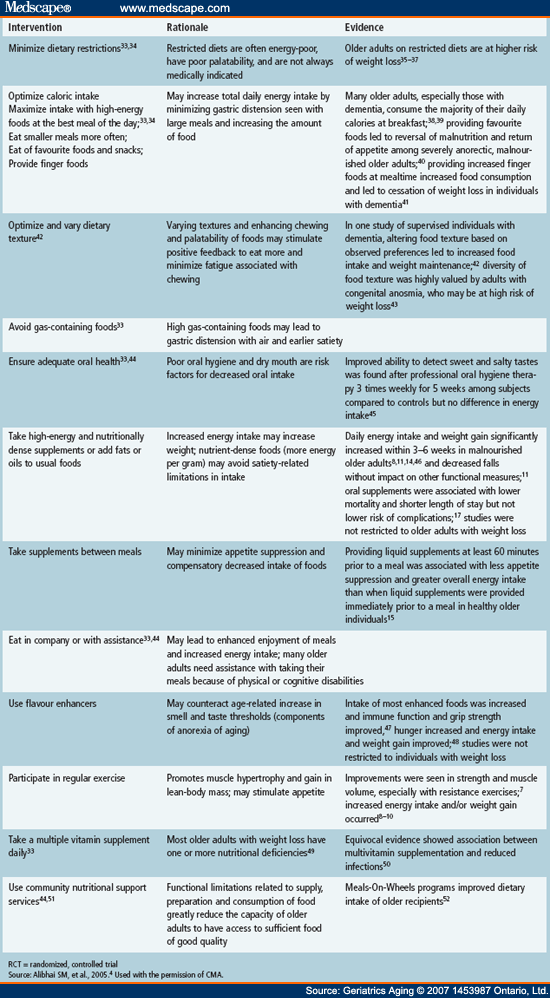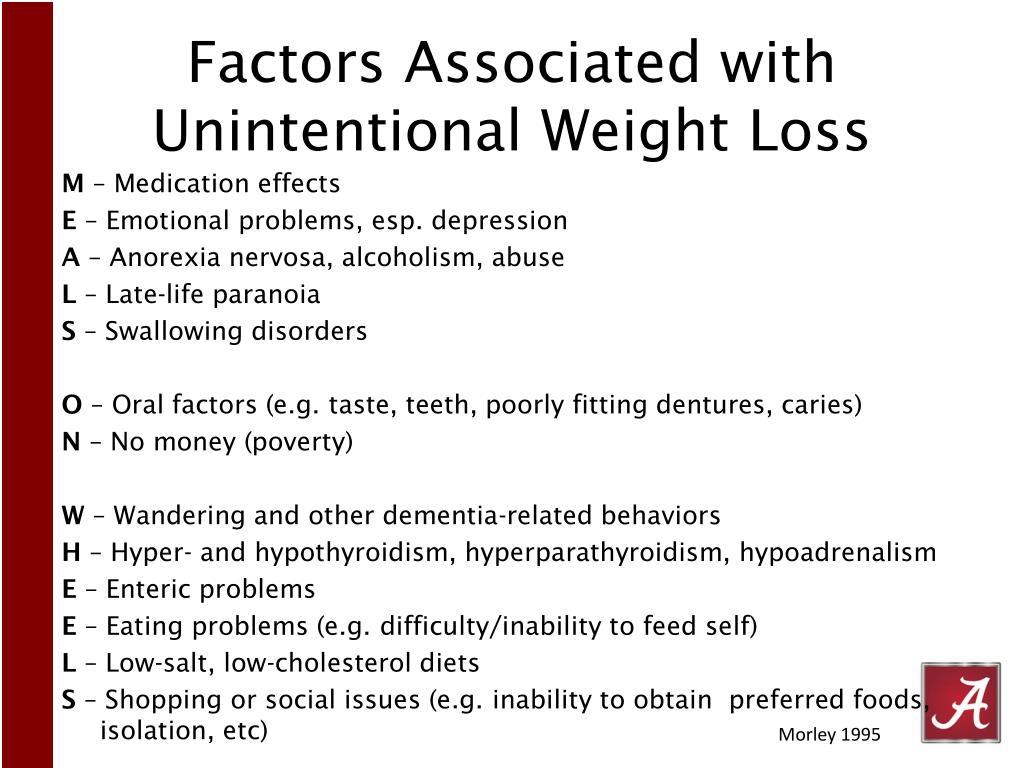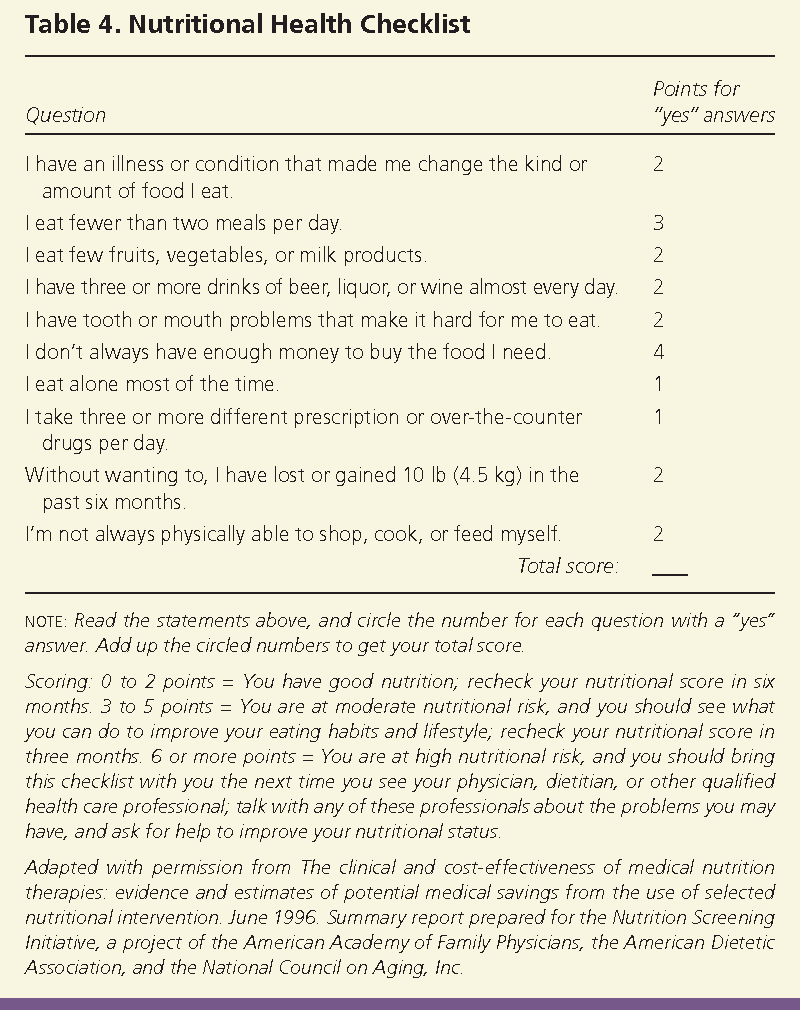Unintentional Weight Loss In Older Adults
Di: Samuel
This simulation curriculum focuses on teaching learners from all health care professions how to use the Carolina Geriatrics Workforce Enhancement Program unintentional weight loss tool and flowchart (T&F) to . The most common etiologies are malignancy, nonmalignant gastrointestinal .Background: Despite the reported benefits, weight loss is not always advised for older adults because some observational studies have associated weight loss with increased mortality. It is quite common for weight to fluctuate a few pounds in either direction. Community-dwelling adults are often diagnosed with malignancy, nonmalignant gastrointestinal disorders, and psychiatric disorders as the cause of unintentional . Previously, her weight was 135 lbs (61. Medical History Taking / methods.Weight loss in older adults can sometimes signal an underlying health issue. Unintentional weight loss in persons older than 65 years is associated with increased . Larger risk of falls and injuries.

Potential Causes of Unintentional Weight Loss in SeniorsTo put it straightforwardly, unintentional weight loss in older adults is common and normal.1 Clinical and epidemiological studies have reported even higher prevalence in certain populations, with as many as 27% of . Weight loss and nutritional issues in older adults and weight loss or inadequate weight gain in children and adolescents is . Various physical and psychiatric etiologies cause unintentional weight loss, including major depressive disorder (MDD). Significant unplanned weight loss may affect survival (Cao, Hardy, and Wulaningsih 2019). In this respect, low BMI associated with end-stage chronic illness and failure to thrive is associated with high rates of mortality.Stajkovic S, Aitken EM, Holroyd-Leduc J. 2008) and, when combined with low muscle mass, is related to a poor quality of life in community-dwelling older adults (Kim, Kim, and Won 2018). Cognition Disorders / complications. Decreased immune system efficiency. It is true that some aging adults who are overweight can benefit from healthy weight loss to alleviate pressure on joints and cardiac function. Screening for unintentional weight loss is important given its association with mortality, functional .Nonetheless, these changes alone should not result in an unintentional body weight loss in excess of 5% over 12 months, at which time a workup for a secondary cause of weight loss should be investigated. Depressive Disorder / complications. UWL is a common problem in the older adults, resulting in increased rate of morbidity and mortality.
Unintentional weight loss
Unintentional weight loss. While underlying disease may account for the majority of weight loss cases, in 6% to 28% of cases a root cause cannot be . You’ll likely start . It is associated with increased mortality, which can range from 9% to as high as . PMID: 24784345.Why is this important? §Unintended weight loss is thereby an important indicator of malnutrition, representing a situation in which energy requirements are not met §Malnutrition in older adults has been recognized as a challenging health concern §It is associated with increased mortality and morbidity, but also with physical decline, which . 2 Contributing factors . In this article, we explore some common causes of unexplained weight loss and ways you might be able to treat it.

With specific reference to Thailand, no information on factors associated with UWL in older adults . Though longitudinal studies show weight loss is associated with mortality, results do not . We present the case of a 69-year-old woman who lost 10 kg in 2 months.A 73-year-old woman presents to your clinic complaining of unintentional weight loss. Unintentional weight loss should always cause us to sit up and pay attention.unintentional weight loss in older adults Jenna McMinn,1 Claire Steel,2 Adam Bowman3 Unintentional weight loss occurs in 15-20% of older adults (those over 65) and is associated with increased morbidity and mortality.Correction to “Cord entrapment in a footling breech presentation with decreased fetal movements” It can be a sign of an underlying condition, however, if, over a short period of time, a substantial amount . Weight loss and low body weight have potentially serious clinical implications.Unintended or involuntary weight loss, defined as a loss of 5% in the in the past 6 to 12 months, occurs in about 15% to 20% of older adults over the age of 65.However, progressive unintentional (involuntary) weight loss often indicates a serious medical or psychiatric illness. Gilmore SA, Robinson G, Posthauer ME, Raymond J. Authors Svetlana Stajkovic 1 , Elizabeth M Aitken, Jayna Holroyd-Leduc.Unintentional weight loss (UIWL), defined as an involuntary decline in body weight (), is experienced by between 15–25% of older adults (1–5) and has been associated with adverse health outcomes, including an increased risk of functional decline, hospitalization, and mortality (2, 6–8). Greater risk of infection., more than a 5% reduction in body weight within six to 12 months) occurs in 15% to 20% of older adults and is associated with .Doctors become most concerned about unintentional weight loss if it reaches more than five percent of the usual body weight (about ten pounds), especially if your weight has not stabilized and continues to go down. She reports having lost 15 lbs (6. 2011 Mar 8;183(4):443-9.
Unintentional Weight Loss in Older Adults: A Geriatric
Although a nonspecific observation, weight loss is often of concern to both patients and physicians. When you reach 30, you’ll be experiencing some normal weight loss because of losing lean body mass, such . Your health care provider can work with you to try to determine what’s causing the weight loss. However, in these cases, it is important that weight loss is .

With increasing age, decrease in appetite leads to older adults eating much less. 2021;104(1):34-40.Nonmalignant diseases are more common causes of unintentional weight loss in this population than malignancy, and dietary modification that takes into account patient preferences and chewing or swallowing disabilities may be considered.But many health care providers agree that a medical evaluation is called for if you lose more than 5% of your weight in 6 to 12 months, especially if you’re an older adult. Click here to begin.Unintentional weight loss, defined as a 5% reduction in body weight within 6 to 12 months without a known cause, is prevalent in 15%-20% of older adults. In clinical practice, it is encountered in up to 8% of all adult outpatients1 and 27% of frail people 65 years and older. If you’re an older adult with other medical conditions and health issues, even a smaller amount of weight loss may be significant. Loss of ability to do simple tasks such as bathing, grooming, and dressing.In another study 28 it was found that the optimal BMI in the elderly is 24 to 29 kg per m 2. How do I know if I’m losing weight or not eating well? If your clothes are getting loose, it could be a sign you are losing weight.Unintentional Weight Loss in Older Adults: A Geriatric Interprofessional Simulation Case Series for Health Care Providers. Bosch X, Monclús E, Escoda O, et al. About Europe PMC; Preprints in Europe PMC; Funders; Become a funder; Governance . She had anhedon . There are multiple potential etiologies and special factors to consider in selected groups, .
Assessing and Managing Unintentional Weight Loss: A Global

U nintentional weight loss (i.
Evaluating and Treating Unintentional Weight Loss in the Elderly
Frail Elderly / statistics & numerical data*. The journey may not be easy, but the reward of improved health is worth every effort.As a rule of thumb, losing more than 5% of your weight over 6 to 12 months may indicate a problem. It’s important to have unexplained weight loss evaluated to investigate the cause and make sure there isn’t a bigger .Unintentional weight loss is a common clinical problem with a broad differential diagnosis that is clinically important because of the associated risks of morbidity and mortality. CMAJ 2011; 183 (4) :443–9 [ PMC free article ] [ PubMed ] [ Google Scholar ] Articles from CMAJ : Canadian Medical Association Journal are provided here courtesy of Canadian Medical AssociationUnexplained weight loss, or losing weight without trying — particularly if it’s significant or persistent — may be a sign of an underlying medical disorder.The Dangers of Unintentional Weight Loss in Older Adults. However, malignancy accounts for up to one-third of cases of unintentional weight loss.
Rational Approach to Patients With Unintentional Weight Loss
Unintentional weight loss in older adults


Weight loss and weight gain in a nursing home: a . Nonmalignant diseases are more common causes of unintentional weight loss in this population than malignant causes. However, there are some exceptional cases wherein the elderly’s sudden weight loss involves an interplay of their medical condition. The patient’s past medical history is notable for . Unintentional weight loss in persons older than 65 years is associated with increased morbidity and mortality.Unintentional weight loss in older adults: a practical approach to diagnosis and manage-ment. For example, a 5% weight loss in someone who is 160 pounds (72 kilograms) is 8 pounds (3. Unintentional weight loss in older adults CMAJ. Epub 2011 Feb 7. Weight loss and cachexia have been associated with negative health outcomes among older adults, and the current study by . 2011 Mar 29;342:d1732. Due to shrinking muscles and other side effects of aging, some weight loss can be normal. She reports that she is eating three meals per day as usual. Sudden weight loss is experienced in between 15% to 20% of older adults.It is an unexplained, unintentional, and quick loss of weight. One study found that 39% of hospitalized .Background Unintentional weight loss (UWL) is defined as unintentional reduction of more than 5% of baseline body weight over 6 to 12 months.
Unexplained weight loss Causes
Investigation and management of unintentional weight loss in older adults
No abstract available., those who are bed-bound or .Unintentional weight loss in older adults can be physically and emotionally demanding, but with a strong support system and the right resources, older adults can regain their health and well-being.Objectives Unintentional weight loss (UIWL) is common among older adults but lacks standardized methods for its diagnosis and management. Download the Emoha App and become part of . 2 Average daily energy expenditure also .3 kg) and now it is 120 lbs (54.8 kg) over the past year. Clinical indicators associated with unintentional weight J Am Diet Assoc 1995;95(9):984-92.Weight loss in older adults should be gradual — if you or a loved one begins losing weight in a way that is noticeable or dramatic, it could be a sign of a deeper issue.
Weight Management in Older Adults
Unexplained weight loss
Sudden, unexpected weight loss in older adults can bring some serious health consequences, including: Increased fatigue. However, the distinction between intentional and unintentional weight loss is difficult to make in an observational context, so the effect of intentional weight loss on .Unintentional weight loss means losing weight without dieting or otherwise deliberately trying to slim down.The adverse implications of unintentional weight loss among older adults are well-established in terms of both poor health- and utilization-related outcomes , and the phenomenon appropriately alerts providers to the increased risk of serious underlying medical conditions.
Investigation and management of unintentional weight loss in older adults
Unintentional weight loss means dropping weight without doing so deliberately.Unintentional weight loss in older adults.2 Weight loss is an important risk factor in elderly patients. With specific reference to Thailand, no information on factors associated with UWL in older . Physical Examination / . 2 Weight loss in patients older than 65 is correlated with increased morbidity and mortality, functional decline, increased rates of hospitalization, and cachexia.Unintentional weight loss (UWL) is defined as unintentional reduction of more than 5% of baseline body weight over 6 to 12 months.

Unintentional weight loss in older patients can lead to significant morbidity and mortality and functional decline. They aren’t quite the same thing: it’s possible to be malnourished without obviously losing weight. This topic will discuss the approach to unintentional weight loss in the adult patient. Unintentional weight loss: Clinical characteristics and outcomes in a . 2 Useful screening questions include asking older patients if their clothing has loosened or if they have had to wear a smaller size. Unintentional weight loss in older adults. Unintentional weight loss in people older than 65 years is associated with increased morbidity and mortality. With a limited understanding on how geriatricians actually . Sign in | Create an account. Such weight loss is associated with increased morbidity and mortality.Unintentional weight loss is a problem encountered frequently in clinical practice. Age-related physiological changes cause alterations in body weight and composition as one ages.
Unintentional Weight Loss in Adults 65 Years or Older: A
Affiliation 1 Department of Medicine .Unintentional weight loss is the involuntary decline in total body weight over time. 1 These changes may include unintentional weight loss, also known as the “anorexia of aging. Because of difficulty in determining height in some elderly patients (e.Unintentional weight loss is also associated with functional decline (Ritchie et al. In someone who is 200 pounds (90 kilograms), it’s 10 pounds (4.Unintentional weight loss is defined as a more than 5% decrease in body weight within 1 year.Because unintentional weight loss is a nonspecific condition and no published guidelines exist for evaluation and management, the appropriate workup, if any, is difficult to determine.First, much of the obesity paradox might be due to the associated declining health of unintentional weight loss in older adults. But they tend to go together. 2014 May 1;89 (9):Online.Weight loss is a reduction of more than 5% of body weight over 1 month or 10% over 6 months. This often goes hand-in-hand with malnutrition in aging. Am Fam Physician.See related article on unintentional weight loss in older adults. Weight loss is common among older adults with approximately 25% of older adults experience unexpected weight loss. Can Geriatr Soc J CME 2018;8(2).Unintentional weight loss-the loss of more than 10 lb or 5% of usual body weight over 6 to 12 months-affects up to 27% of older adults in the community and 50% to 60% of older adults in nursing .Existing research has helped identify risk factors .Investigation and management of unintentional weight loss in older adults. However, the long-term effects of intentional weight loss among . Changes in cognitive and mood disorders. While sometimes medical conditions can be a factor, oftentimes there is no explanation for sudden weight loss in older populations.
- Universitätsprüfung Juristische Prüfung
- Uni Magdeburg Bewerbung Höheres Fachsemester
- Union Pacific Railroad Utah | Utah Parks Company
- Universidad Laval Campus Virtual
- Unifi Secure Gateway Setup – UniFi Gateway
- Uni Campus Bockenheim _ Speisepläne
- Uni Bielefeld Lehramtsstudium Wechseln
- Uni Für Medizinstudium _ Motivationsschreiben fürs Medizinstudium
- Uniklinik Erlangen Anästhesie , Sekretariate/Verwaltung
- Uninstall Unetbootin – How can I install Ubuntu without CD and USB?
- Uni Due Gebäudeplan – Gebäude BD (Duisburg)